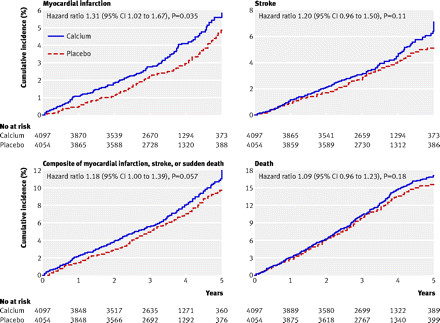骨粗鬆症にカルシウム摂取は定着しましたが、カルシウムの摂取によるリスクも懸念されています。何を注意すべきか、考えながら読みたい論文です。Clinical Evidenceなどでは、どう整理されているのか、気になるところです。
15のRCT(毎日カルシウムを500mg以上、40歳以上、1年間以上を条件とし、死亡率の低下が示唆されるビタミンDの併用試験は除外)のメタ分析で、カルシウムを摂取した群は、摂取していない群と比べ、約30%心筋梗塞や心臓血管病リスク(ただし、心筋梗塞のみ有意差有り)が高まるということがわかったそうです。
気づき)
・腎不全患者でカルシウムと死亡率増加との関連と同じ(N Engl J Med2000; 342: 1478-1483)
・リスクの上昇は控えめだが,カルシウムが広く摂取されているので、国民レベルの負担は大きいいか?
・カルシウムによる血管石灰化の促進を、心筋梗塞リスク上昇の原因と予測されている。
BMJ 2010;341:c3691
Effect of calcium supplements on risk of myocardial infarction and cardiovascular events: meta-analysis
Objective To investigate whether calcium supplements increase the risk of cardiovascular events.
Design Patient level and trial level meta-analyses.
Data sources Medline, Embase, and Cochrane Central Register of Controlled Trials (1966-March 2010), reference lists of meta-analyses of calcium supplements, and two clinical trial registries. Initial searches were carried out in November 2007, with electronic database searches repeated in March 2010.
Study selection Eligible studies were randomised, placebo controlled trials of calcium supplements (500 mg/day), with 100 or more participants of mean age more than 40 years and study duration more than one year. The lead authors of eligible trials supplied data. Cardiovascular outcomes were obtained from self reports, hospital admissions, and death certificates.
Results 15 trials were eligible for inclusion, five with patient level data (8151 participants, median follow-up 3.6 years, interquartile range 2.7-4.3 years) and 11 with trial level data (11 921 participants, mean duration 4.0 years). In the five studies contributing patient level data, 143 people allocated to calcium had a myocardial infarction compared with 111 allocated to placebo (hazard ratio1.31, 95% confidence interval 1.02 to 1.67, P=0.035). Non-significant increases occurred in the incidence of stroke (1.20, 0.96 to 1.50, P=0.11), the composite end point of myocardial infarction, stroke, or sudden death (1.18, 1.00 to 1.39, P=0.057), and death (1.09, 0.96 to 1.23, P=0.18). The meta-analysis of trial level data showed similar results: 296 people had a myocardial infarction (166 allocated to calcium, 130 to placebo), with an increased incidence of myocardial infarction in those allocated to calcium (pooled relative risk 1.27, 95% confidence interval 1.01 to 1.59, P=0.038).
Conclusions Calcium supplements (without coadministered vitamin D) are associated with an increased risk of myocardial infarction. As calcium supplements are widely used these modest increases in risk of cardiovascular disease might translate into a large burden of disease in the population. A reassessment of the role of calcium supplements in the management of osteoporosis is warranted.
これから)大阪へ。猛暑つづくので「残暑見舞い」書き。


コメント